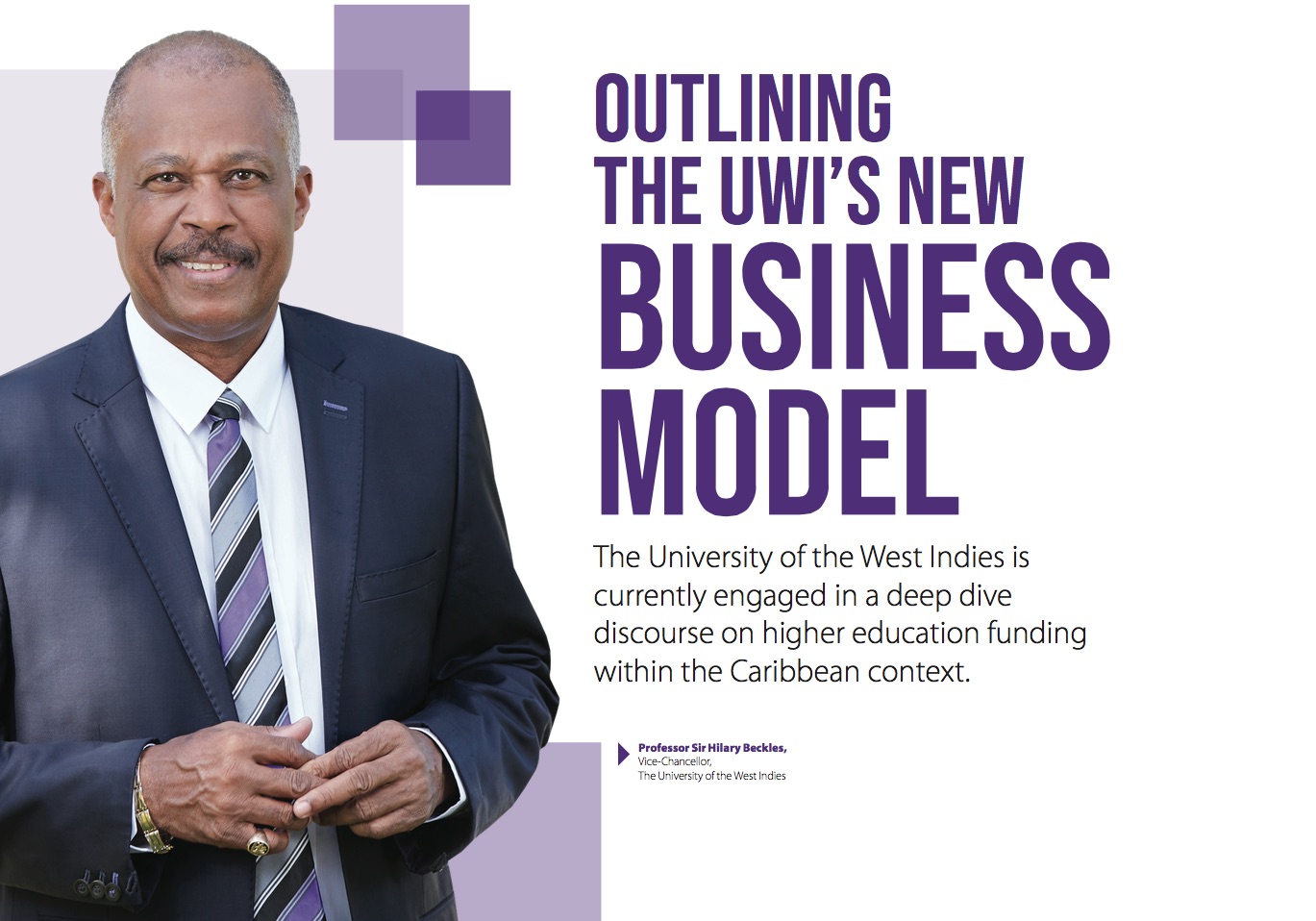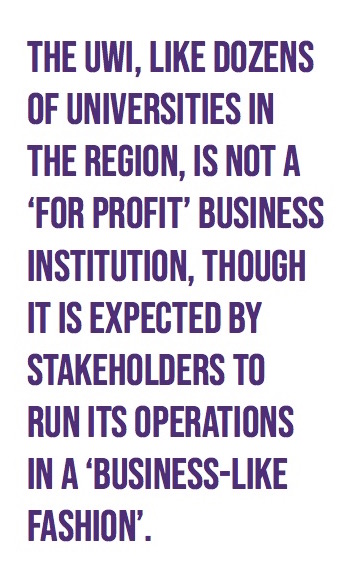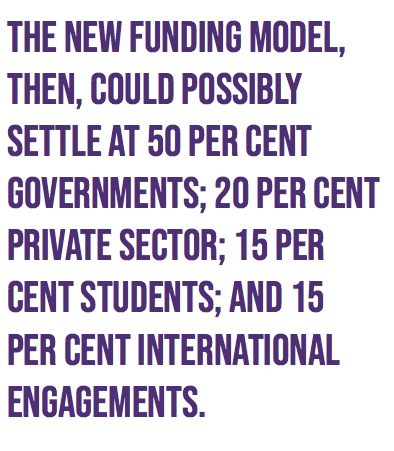
The University of the West Indies is currently engaged in a deep dive discourse on higher education funding within the Caribbean context. It is arguably one of the main development challenges facing our regional community. We therefore see this conversation as a critical part of the search for a solution-oriented financial paradigm.
In this regard, it is important to note, however, that there are overlapping issues that must be untangled for the purpose of analytical clarity and thematic differentiation. There is the institutional matter of how The UWI singularly, as the number one ranked university in the Caribbean, is seeking to improve upon its financial health in order to assure its sustainability as a regional centre of academic and development excellence. Then, there is the broader system issue of what strategy and model should be adopted by stakeholders to fund higher education with its diversity of institutions and mandates across the region. There is obviously an inter- connection at all levels of thinking between the two.
The UWI, like dozens of universities in the region, is not a 'for profit' business institution, though it is expected by stakeholders to run its operations in a 'business-like fashion'. We have the flexibility to be market-driven, but there is always the matter of catering for the 'public good' that sometimes requires a more complex decision- making process. The expectation of demonstrated financial efficiency in the use of public funds lies at the heart of our governance model, hence the selection of distinguished corporate minds to chair and manage our financial and audit committees, campus councils, and who play a critical role in discussing the responses to the university's external audit reports.
The business model on which the university operates was regionally approved for campuses to implement. Simply put, all programmes are costed, and the cost sharing splits out into an 80% support from governments (mostly the campus governments) and 20% from students. The university bills governments for the 80% in respect of national students, and bills the students for their 20%.
In the case of Barbados and Trinidad and Tobago, the governments pay both the 80% and 20% for its nationals. When governments do not meet the billing, it goes into arrears and should be accounted for as a receivable in audited accounts. This shortfall, started to balloon out of control 20 years ago, and constitutes the principal driver of bad news on the balance sheet.
The challenge the university is faced with, then, is how best to grow its expansion of new and innovative programmes, promote relevance, transform research, and be a source of public advocacy, with public funding shrinking at a significant rate, while maintaining its standing as a university ranked in the top 4% of the best 28,000 universities globally. At the moment, the governments' contributions cover about 50% of the university's overall operational cost. Student fees' input hover at about 15%, leaving the university to find 35 per cent from its entrepreneurial activities.

The first point to make in this regard is that the governments, in the grind of their fiscal challenges derived from shrinking economies, must be celebrated and not in any way criticised for this circumstance. While their relative contribution to operational budgets has fallen from 90% to 50% over 30 years, their absolute contributions in hard cash has risen dramatically over the same period. Governments have carried this UWI on their shoulders for 72 years. In 2018, we took the opportunity of the CARICOM meeting in Montego Bay, under Prime Minister Holness' chairmanship, to thank them for a phenomenally well done job, taking us from depending on the colonial scaffold in 1948 to a global elite brand we celebrate today.
How, then, do we move forward as we drive our operations to the centenary in 2048? We will be asking our governments to maintain their funding levels to about 50%. This is enough to stabilise day- to-day operations, leaving us to be more aggressively entrepreneurial in search of development funds. We will be proposing, in this regard, to begin with a new business model in which the governments will be requested to market about 20% of their 100% equity in The UWI to private investors.
We hope, therefore, that this will take care of 70% of operations. Given the growth of working-class poverty in recent decades, and the need for more equitable access from historically marginalised communities, we are inclined to keep student fees stable for the near future, contributing the 15% it currently represents.
The new funding model, then, could possibly settle at 50% governments; 20% private sector; 15% students; and 15% international engagements. Already, discussions are advancing nicely to enable this new model. Governments, for example, are considering adopting the US model of allocating campus lands to the university freehold as opposed to leasehold. The UWI can therefore become a land-grant university. This has enormous entrepreneurial implications, as well as potential for balance sheet improvement, and the financial marketability of the institution.
Furthermore, The UWI is engaged in advanced conversation with the private sector in terms of how best to present it with an investment instrument to enable private/public partnership.
It should be stated, however, that the University Grants Committee approved, last year, the establishment of a 'New Funding Model Committee' which has made very innovative recommendations that are being assessed. The University Council Meeting in April 2020, will be receiving the package of ideas that have been approved. In addition, we have created an “Office of Global Partnerships and Sustainable Futures” to significantly upgrade the revenue stream for research funding and project development.
In summary, then, The UWI has radically transformed its thinking and actions on this matter; 2021-2022, will see the roll out of an approved new financial model that will seek to erase the US$75-million funding gap that currently exists. Pressure to implement the new approach is driven by the fact that we carry about 10,000 students beyond our budgetary provision. Mona, for example, carries about 3,000 Jamaican students beyond budgeting who are funded by its entrepreneurial efforts.
These decisions are taken because The UWI is not here to serve itself. It is not a profit-driven corporation. It is here to serve our communities. Service, then, not sales, is our eternal episteme.

With respect to a funding model for the wider Caribbean, we have created a regional body comprising more than 50 regional institutions called 'Universities Caribbean'. I have been asked to be the inaugural chairman for three years. This gives The UWI an opportunity to provide guidance and leadership to the regional university system.
Internationally, the question is often asked, how does The UWI maintain its elite ranking located as it is in an economy that has not seen sustained economic growth in 30 years? The answer is obvious - deep stakeholder commitment, focused leadership, and the power of dedicated, unwavering colleagues.
The new funding model, then, is unfolding before our very eyes, and will be ready for discussion and approval within our management organs in 2020. With the continued blessings of our governments, the requested investment support of our private wealth holders and the loyalty of international agencies, the plans on the table to drive the internal entrepreneurial business culture for greater financial self-reliance will be sprung into action.
Across the region, despite success in macroeconomic stabilisation, and efforts to mobilise significant national and foreign investments, the elusiveness of economic growth at the expected levels seem to defy standard explanations, and is therefore mysterious. A question raised is whether the university sector, beyond its teaching and research remit, can add greater value and constitute, in time, the yeast that will enable the cake to rise.
There are features about the sector that require immediate recognition. In terms of building the human capital stock, the Caribbean has the lowest higher education enrolment in the hemisphere within the relevant age cohort, 18-30 years. At the moment we are hovering at less than 25% against a North America average of near 60% and Latin America approaching 45%. Within CARICOM, the Bahamas and Barbados lead the chart, with Jamaica and Trinidad and Tobago bunched in the middle, and the Windward Islands at the base.
The challenge here is that using any model of economic growth, the potential of a country for transformative and sustained economic growth is a function of the number of its citizens who have had higher education, professional development, and technical skills certification. The data for our region are not encouraging and would suggest that our countries are being held back on account of inadequate social capital.
In other words it can be argued that Caribbean states are being held back not by insufficient investment capital but by a shortage of skills and professional mentality in the critical areas of the economy that are expected to super perform.
Recognising that this is the age of innovation and knowledge-driven growth, it is reasonable to expect that the university sector, as a custodian of the knowledge content, should be at the centre of any and every growth paradigm. That is, this is the age in which the university sector is expected to lead the way or be a critical partner in the search for new and innovative economic sectors, and facilitating the transformation of old sectors.
Technology Parks were created to support industry- academic ecosystems in which professors and producers, teachers and technologists, came together to innovate on industry terrain. This is how Silicon Valley began, and China's Technology Park in Suzhou operates. Operating in the neighbouring spaces served to normalise the relationship between research information and product investment. The alignment revolution that brought business and campus together for the national purpose also served to drive the enrolment upsurge because it pulled younger generations into the “making things” culture, and the “thinking things” systems.
In newly post-colonial countries like ours in the Caribbean, which did not receive at independence any reparations development packages from imperial Britain, building out a quality higher education sector is a complicated cost- benefit proposition. There are two aspects to this challenge.
First, in modern market economies, there is a tendency for the unit costs in the university sector to rise at a faster rate than in other sectors of the economy. This has to do with the fixed maintenance of libraries, laboratories, and staffing structures. Second, the tendency in democracies for policy to be distorted along the short-term trajectory, while building social capital for economic growth is a middle to long-term strategy.
In addition, there is the structural problem of social exclusion and majority market marginalisation that has proven to be very resilient. Truth is, our societies rooted in colonial oppression, have remained among the most unequal globally, with nearly 30% of citizens 'locked' away in ghetto conditions. In the 1930s when the colonial state was rejected incipient national liberation movements called for slum clearance as the top priority, even ahead of adult suffrage. We got no support from imperial Britain, who created the colonial mess, and the problem has overwhelmed our national efforts.

The result has been that the national social growth which the university sector wants to take responsibility for has not kept up with national expectation. Too many citizens are placed in a situation where they do not believe that national institutions serve their normal living purposes resulting in an opposition approach. But social growth is not a consequence of economic growth but a prerequisite. Herein lies the dilemma. Education cuts don't heal. In our education system, over generations, ministers have preached about the plumbing being broken in the basement contributing to challenges higher up in the system.
Taking from the tertiary level to fix the primary might seem the right choice, but without an expansive tertiary the industry inputs we need will be unavailable. Politically, it is a bitter conundrum pill.
The UWI has done a great deal to address some of these matters beyond the expected output associated with generating social capital through teaching and research, and opening though insufficiently, the door to higher learning to the historically marginalised and still socially excluded.
Another aspect of this challenge is whether each UWI campus should be at the core of a national tertiary system of multiple institutions that is largely borderless, delivering a good quality experience for students at lower cost and greater efficiency. The answer is that we are laying the foundations for this approach. We have created a new category called Colleges of The UWI (CUWI). These independently managed colleges will be integrated for programme delivery purposes to meet the objectives of lower costs and better quality. This approach is in its formative phase and there is considerable potential.
There are other areas where The UWI can do much more if adequately funded. It is important to note that the funds currently made available by the Caribbean governments would be sufficient if the University had as its primary concern its own preservation. That is, if the purpose of pursuing excellence was for self- aggrandisement then with a 30% less enrolment it could do well on existing budgets. We should not minimise however the result that our subregion has within it the best ranked university in the Caribbean, which is rated in the top 4% of the world's best 28,000 universities.
But, The UWI is here to serve the development of the region as its top priority, and has therefore taken on an enrolment of 50,000 students, beyond its financial capacity. But with the region at the bottom of the hemisphere in student enrolment, and undermining economic growth and development, The UWI has had to function with a significant measure of deficit financing for the public good. We are managing this situation with considerable financial skill and within a diplomatic discourse with our governments. But this situation is not sustainable.
The need for a new financial regime is now upon us. We are deeply preparing for the roll out of a new model in which the private sector and our 100,000 alumni will be invited to invest. The State sector has done very well these past 72 years. It is time for the private sector to step up beyond philanthropy, and for the University itself to be more entrepreneurial. Implementing this new business and finance regime is the primary task of the next few years.
The UWI's reputation as a globally elite university has never been higher. We are respected and celebrated more than ever. This reputation revolution now has to be converted into a more sustainable financial model. This is our remit for 2020-2022, the second part of our Strategic Plan period. It's an exciting time for us to implement the new financial order, but first we have to be precise and perfect in our conception. The success of this financial transformation will depend on the support of all stakeholders. It will be excellent for the institution and good for the region it serves.